Understanding the different types of coffee certifications help people leverage their purchasing power to support initiatives that prioritize our ecosystems and improve the lives of farmers. Our guide sheds light on the world of coffee certifications to help foodservice professionals to make informed choices that align with their values as well as choices that resonate with their customers.
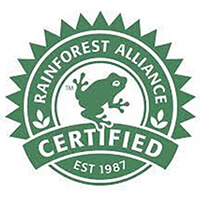 Rainforest Alliance
Rainforest Alliance
The first certification on our list is courtesy of the Rainforest Alliance, who’s certified seal is a widely recognized symbol of sustainability across the globe. Founded in 1983, the Rainforest Alliance initially focused on forest conservation efforts. After recognizing the interconnectedness of forests and agricultural practices, they launched the Sustainable Agriculture program in the late 1980s.
This ever-evolving coffee certification program casts a wide net by focusing on three pillars of sustainability: environmental, social, and economic. The Rainforest Alliance’s environmental standards include protecting forests, conserving water, and promoting biodiversity. Their social standards address fair labor practices, safe working conditions, and community development. Lastly, the economic standards they’ve set forth aim to improve farm productivity, fair wages, and financial stability for coffee producers.
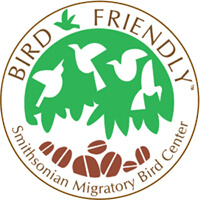 Bird-Friendly
Bird-Friendly
Calling all bird enthusiasts! The Bird-Friendly certification verifies that coffee farms maintain shade tree cover to provide a healthy habitat for migratory birds and reducing the need for pesticides.
In the late ‘90s, scientists at the Smithsonian Migratory Bird Center raised concerns after observing a decline in migratory songbird populations. These scientists then linked their population decline to habitat loss in Latin American countries, right where many coffee farms were located.
To counter this phenomenon, the Bird-Friendly a certification program was born. This certification program both recognizes and rewards coffee producers who maintain shade-grown environments and show genuine efforts to combat any further ecological devastation for our winged friends.
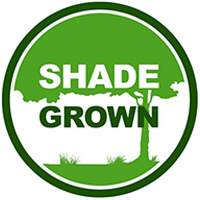 Shade-Grown
Shade-Grown
Although not an official certification at this time, coffee labeled “Shade-Grown” simply means producers provide shade for coffee plants in order to mimic natural forest ecosystems and promote biodiversity. As a label, it is very similar to the Smithsonian’s Bird-Friendly certification program.
Traditionally, coffee was grown under the shade of other trees, mimicking its natural forest habitat. Then, in the mid-1970s, sun-tolerant coffee varieties and high-density farming practices were introduced to increase yields. However, this led to deforestation and a decline in biodiversity in coffee-growing regions which then led to the development of shade grown coffee farms.
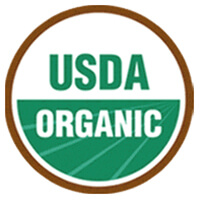 USDA Organic
USDA Organic
The USDA Organic coffee certification emerged as part of a broader movement towards sustainable agriculture in the United States. In light of this movement, coffee producers with the USDA Organic certification typically support soil health, biodiversity, and water quality. This government certification guarantees the use of approved organic practices, including keeping synthetic fertilizers and pesticides out of our morning cup of joe.
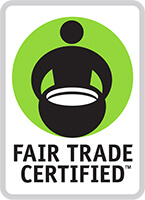 Fair Trade
Fair Trade
Fair Trade certification prioritizes fair wages for farmers and workers, ensuring they receive a minimum price and a premium for community development projects.
The specific program for coffee certification began in 1988 in the Netherlands. This came after the dismantling of the International Coffee Agreement, which had previously helped regulate prices. The dismantling led to a decline in coffee prices for producers, and the Fair Trade certification aimed to offer an alternative market that ensured fairer prices for small-scale coffee farmers.
Today, Fair Trade coffee certification remains an established system with multiple organizations involved, such as Fairtrade International and Fair Trade USA. The system aims to ensure fair prices, promote social responsibility, and support sustainable practices for coffee farmers worldwide.
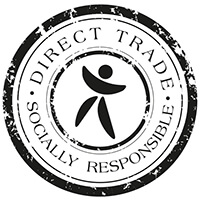 Direct Trade
Direct Trade
First, Direct Trade is not an official certification, however, this label provides a lot of value. While both Fair and Direct Trade initiatives share the goal of ensuring fair prices and improving conditions for coffee producers there is one key difference. Direct Trade emphasizes building long-term, transparent relationships between roasters and farmers, bypassing intermediaries and focusing on better pay for producers.
As a result, different organizations and roasters have implemented their own standards and verification methods to assure consumers that their coffee adheres to direct trade principles. To find Direct Trade beans, seek out roasters who highlight direct partnerships with specific farms or cooperatives.
Use Your Purchasing Power to Brew a Better Future
Choosing ethically and sustainably sourced coffee reduces your environmental footprint. This, in turn, enhances your brand’s reputation and aligns with responsible business practices. Do you use your purchasing power to support specific coffee certifications? Let us know in the comment section!



